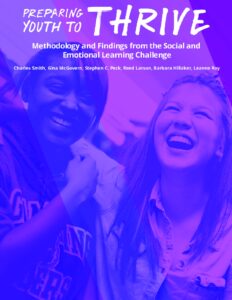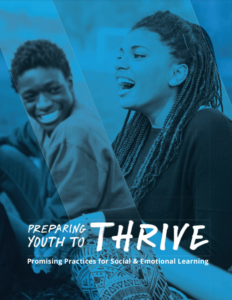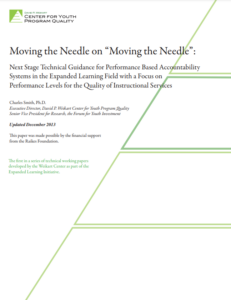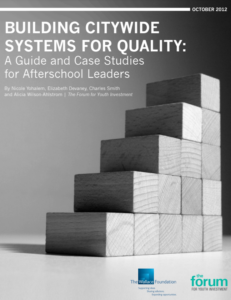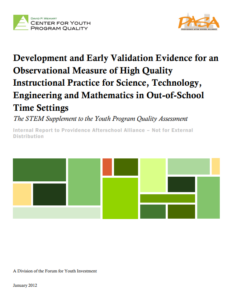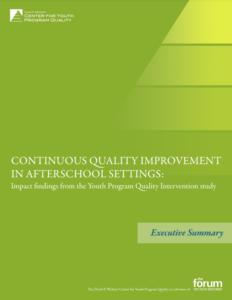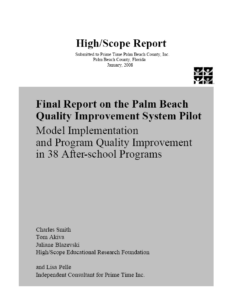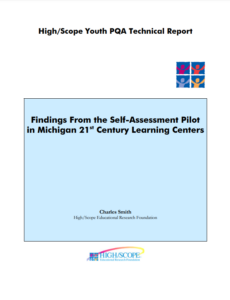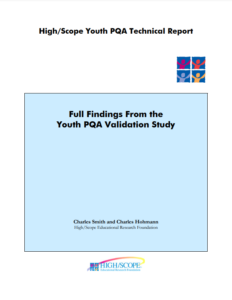This technical report describes methodology and findings for (1) best-practice SEL standards, (2) validation of a suite of SEL performance measures for use in QIS, and (3) performance benchmarks for out-of-school time programs focused on building SEL skills with vulnerable children/youth.
Preparing Youth to Thrive: Promising Practices for Social Emotional Learning
The guidebook describes SEL standards and organizational and curriculum features for a set of eight exemplary SEL programs.
Moving the Needle on “Moving the Needle”
This paper introduces the nomenclature of performance-based accountability systems (PBAS) to the expanded learning field, provides a policy case study for a countywide system in southern Florida and uses data from that system to explore the issue of quality thresholds. We present an expanded design standard to guide development and improvement of PBAS policies and further develop a theory of lower-stakes accountability to guide effective use of incentives of various types. Findings suggest that (1) the PBAS framework defines critical concepts and improves our ability to describe existing quality improvement systems, (2) the Youth Program Quality Assessment (Youth PQA) can be used to produce a program rating of sufficient reliability for use in a PBAS, and (3) that the Palm Beach County PBAS design is an exemplar for expanded learning policies.
Measuring Youth Skills in Expanded Learning Systems: Case Study for Reliability and Validity of YDEKC Skill Measures and Technical Guidance for Local Evaluators
This paper uses pattern-centered methods to increase the usefulness of information available from survey-based skill measures, with a focus on using survey-based skills measures to detect skill change over time.
Building Citywide Systems for Quality: A Guide and Case Studies for Afterschool Leaders
This guide offers case studies that explain how cities and intermediaries can work with afterschool providers across a neighborhood, city, or region to build quality into the programs that are part of an afterschool system.
The STEM supplement to the Youth Program Quality Assessment
This report describes the process of development of the STEM supplement to the Youth Program Quality Assessment and preliminary reliability and validity evidence based on data collected during The Afterzone Summer Scholars program sponsored by the Providence After School Alliance (PASA).
Continuous Quality Improvement in Afterschool Settings: Impact Findings from the Youth Program Quality Intervention Study
The David P. Weikart Center for Youth Program Quality conducted a three year intervention study to examine the Youth Program Quality Intervention (YPQI). The YPQI is a data-driven continuous improvement model for school and community-based sites serving youth during afterschool hours.
Palm Beach Quality Improvement System Pilot: Final Report
A presentation of baseline and post-pilot program quality ratings for 38 after school programs participating in a pilot quality improvement system in Palm Beach County, Florida.
Findings from the Self-Assessment Pilot in Michigan 21st Century Learning Centers
Overall 24 sites within 17 grantees participated in the self-assessment pilot study by assembling staff teams to collect data and score the Youth Program Quality Assessment (PQA). Youth PQA data collected using the self-assessment method demonstrated promising patterns of both internal consistency and concurrent validity with aligned youth survey responses.

Original Validation of the Youth Program Quality Assessment (Youth PQA)
The original validation study for the Youth Program Quality Assessment (Youth PQA). The Youth PQA was developed to assess the quality of instruction in afterschool and other education settings.
